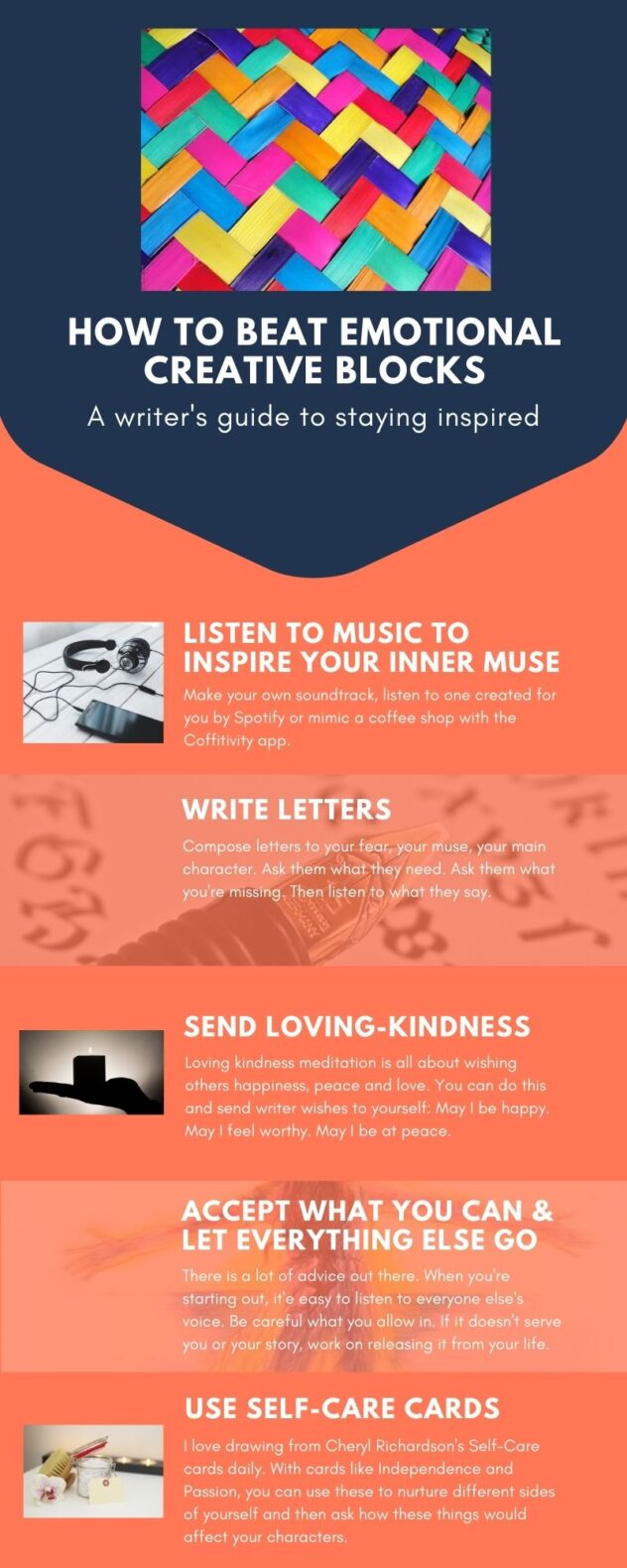It happens to the best of us. Sometimes creative blocks last a few hours after a walk or shower. Sometimes they drag on for months, even years. It’s during these times that we’re likely to give up.
That brilliant premise that got us to our feet every morning now seems like a distant dream or worse a terrible idea.
Yet we hear of writers who became authors after years, a decade even, after slogging through a single manuscript. If we give up, the buck stops there. But what if there were ways can we reignite that flame of passion for our work?
For many of us, we can’t just curl up in a coffee shop or even in a quiet room in our house (do those exist anymore?). We need to take charge of our writing and curate tools that can beat the writer’s block that threatens our career before it even starts.
Here are a few ways you can stimulate your muse and perhaps even nourish that inner critic:

- Create the best soundtrack to inspire words. You can create your own or use Spotify’s The Writer’s Playlist. If you write best in coffeehouses, download Coffivity for free to get the ambiance of your favorite hangout.
- One of the best writing advice I got was from author Elizabeth Gilbert at the Wanderlust festival years ago. As we sat in a room overlooking the ocean at Turtle Bay Resort, we were asked to write letters to different parts of ourselves. I use this technique with my coaching clients to help them uncover unconscious ways they might be sabotaging themselves. It’s also a great way to develop a deeper understanding of your main character. You can, for example, write to your fears and ask it what it’s trying to tell you. What is it trying to protect you from? What does it need from you to feel safe? You can also write a letter to your main character and ask what he or she wants, needs, and is most afraid of.
- Send loving kindness to yourself. Loving-kindness meditation involves best wishes to the people in your life. Writing is hard work and emotionally taxing. To nourish yourself through bouts of anxiety, insecurity and self-doubt, look in the mirror and say, “May you be happy. May you feel worthy. May you be at peace.”
- Accept what you can and let everything else go. There’s only so much we can control in life. A large part of living and writing is learning how to have faith in the process and to let go of criticism that’s not serving us. In Before and After the Book Deal: A Writer’s Guide to Finishing, Publishing, Promoting and Surviving Your First Box, author Courtney Maum says, “What I want to emphasize is that workshops can’t actually help your writing until you understand how to preserve your special sauce. Protecting what is odd and tender about your voice is not you saying that you write better than anyone else, so screw all their opinions… It’s about knowing where your creative boundaries are and getting to the point where you can distinguish useful feedback from biased criticism. The former will actually serve your manuscript. The latter comes from a writer who prefers you write like them. This level of awareness takes time to come by, and in order to get there, you’re going to have to ruin a few pieces by incorporating bad advice. Once you know how to sieve good advice from the extraneous, you can workshop to the high heavens, with your armor intact.” Good advice indeed.
- Use self-care cards. I love Cheryl Richardson’s Self-Care cards and have used them as a therapist with middle-grade students. It’s also a fun way to check in with yourself. With words like, “Passion,” and “Independence” you can also draw upon them for inspiration. Is your main character’s strength passion? Would they benefit from more or less independence? The words itself could spark a chapter or scene. I find new ways to use these cards daily.
![]()

